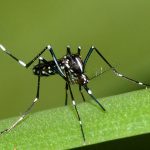
Asian tiger mosquito (photo – Susan Ellis (www.bugwood.org)
Late Friday (10/13), the Jacksonville Daily News reported that a pony had died of what is suspected to be Eastern Equine Encephalitis (EEE) which is transmitted by mosquitoes. In 2016, there was one reported veterinary case of EEE and that was in Pitt County. In 2015, there were five veterinary cases including one in Onslow County. Human cases of EEE are uncommon. According to the CDC n the ten year period (2007-2016), North Carolina had eight human cases of the disease.
It’s important to understand that the virus is not transmitted from one horse to another (or from a horse to a human) or from one person to another. Also, mosquitoes acquire the virus from feeding on infected birds primarily down in the hardwood swamp areas in the southeastern part of our state (where fewer people live). This unfortunate incident doesn’t mean that people need to run out and treat their property with pesticides. It does serve as a reminder that, even though temperatures are starting to drop, it’s still a good idea to use personal protection when engaging in work or recreational activities outdoors. Also, while we’re outdoors cleaning up fallen leaves and pine needles and/or planting flowers or shrubs for next spring, it’s a good idea to look around at areas that are or could be mosquito breeding grounds and eliminate them. More information about mosquito control can be found here: https://entomology.ces.ncsu.edu/mosquito-control-around-homes-and-in-communities/

